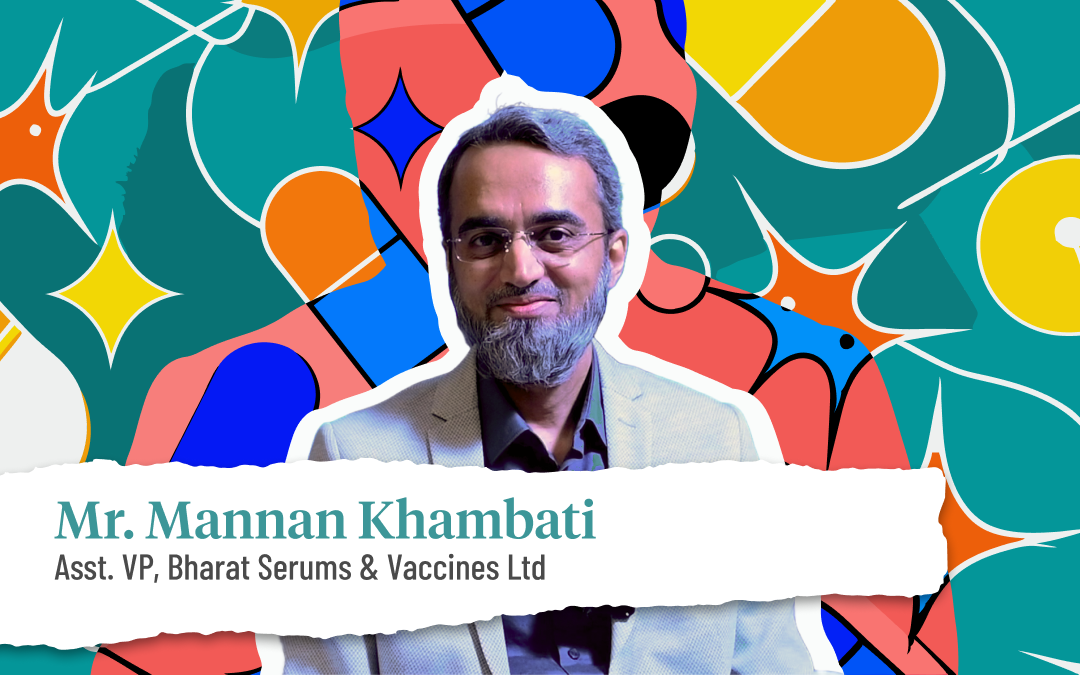QnA
Interview | August 4, 2025
Kimberly Lupo, MS, MBA, is a visionary founder and CEO of Portrett Pharmaceuticals LLC—an analytical contract research organization she launched in June 2021 in Wilmington, North Carolina. With over 17 years of experience in the pharmaceutical services sector, Kimberly’s leadership experience includes long tenures at Metrics Contract Services (Mayne Pharma), IRIX Pharmaceuticals (Thermo Fisher Scientific), and Quality Chemical Laboratories, where she honed her expertise in small‑molecule testing, method development, validation, and CMC regulatory filings. Recognized as a Coastal Entrepreneur Awards emerging company winner in 2022, Kimberly has scaled Portrett’s capabilities with heart and precision—transforming it into a trusted partner for pharmaceutical startups and CDMOs alike.
Pharma Now: Welcome to Pharma Now. Today, we're with Kimberly Lupo, Founder and CEO of Portrett Pharmaceuticals. So, Kimberly, why don't you start with sharing your journey from the very beginning, from starting as a bench chemist to founding Portrett Pharmaceuticals?
Kimberly Lupo: It's great to be here. Thank you so much. In my undergraduate studies, I had this idea that I wanted to start my own lab, so I went on to grad school. Immediately after graduation, I got a job at Metrics Incorporated in Greenville, North Carolina, which was a solid oral dose CDMO. I was in the testing laboratory there, running stability samples, and I just fell in love with the contract space. I learned a lot about the pharmaceutical industry and how it all worked. Being behind the scenes and helping patients indirectly was really exciting for me.
As I progressed, I moved up quickly, learned a lot, and eventually moved into management. Once I entered middle management, I started to interact more with clients. Many of them were complaining about their API contract testing laboratories, and I really felt like I could make a difference and do things differently. That experience eventually led me to start Portrett Pharmaceuticals a few years ago.
Pharma Now: I guess this is a pretty typical path for a founder and entrepreneur to feel like there's something they might be able to do better and start from scratch. But you decided to take a Regulatory Affairs certification. Why is that? I mean, you were doing contract testing, right?
Kimberly Lupo: During my time at Mayne Pharma, Metrics got acquired by Mayne Pharma. They had two divisions: the contract side of things and a generic products division. For a short period of about 15 months, I moved over to the generic products division, and I got a lot more exposure to the regulatory side of things, what needed to be in the FDA filing, what needed to be in the CMC sections, and how my testing reflected that.
That experience made me interested in getting my Regulatory Affairs certification because I wanted to have that knowledge. Through the process, I eventually went back to the contract testing side, and it really helped me understand the clients' needs more. I was actually able to provide guidance and help when they had questions like, “Do we need this?” or “What’s the FDA going to think about this?” It allowed me to deliver better customer service to my clients. So overall, it’s been good all around.
Pharma Now: You also have an MBA, right? But you pursued it while you were working with Mayne Pharma. How did your experience at Mayne Pharma influence your decision to pursue an MBA and eventually start your own company?
Kimberly Lupo: I’ve always looked up. And as I got into middle management, I noticed that all of the executives had their MBA. So, I started questioning it. Do I need that to be in the C-suite? Is that something that’s mandatory? At the time, I reached out to several people, and one of them was Stephan Cross, who was the President of Mayne Pharma. He really encouraged me to get my MBA and to continue pursuing that dream of being in the C-suite.
So, while I worked at Mayne Pharma, I pursued my MBA online from East Carolina. It’s helped me gain a basic understanding of a lot of concepts, things I wouldn’t have known starting a business if I hadn’t done it. It’s definitely been helpful. When I’m talking to investors, bankers, or even my CPA, I can actually be knowledgeable in those conversations and not feel completely lost. So, it’s been valuable in that way.
Pharma Now: So, eventually, you founded Portrett Pharmaceuticals. How does Portrett differentiate itself from other companies in the competitive landscape of pharmaceutical laboratories?
Kimberly Lupo: At Portrett, I developed a unique process flow that pretty much eliminates the queues. Typically, if you go to a large CDMO, your sample gets sent in, and then it sits in a sample queue until it’s assigned to an analyst. The analyst performs the testing, and then the data gets set into a queue for technical review. After that, it moves into a queue for quality review. Some companies even have a separate queue just to generate the report and get the data to the client.
We do everything in real time. Data gets reviewed daily in real time. We initiate testing within one business day of sample receipt or when samples are pulled out of the chamber. QA review happens immediately after the technical review of the data packet. So, we’re doing things in less than half the time of our competitors. For instance, with a typical stability study, you might receive results in four to five weeks from other labs. We've been averaging two weeks, from the moment the sample is pulled out of the chamber to delivering the final report.
That’s one of our main differentiators. But we’re still small, and another big strength is communication. We’re responsive. We actually answer your emails; you don’t have to pull information out of us. We aim to be helpful in any way we can. Sometimes we do have to deliver bad news, and that’s okay; it’s part of the job. But we don’t delay. We communicate in real time as well.
Pharma Now: So, things can go well, and things can go wrong; it really depends on what you're testing. I believe that's just part of the process. From the time you founded Portrett to now, you’ve been scaling up. What year did you start?
Kimberly Lupo: We started in October of 2021.
Pharma Now: Perfect. So, while scaling up, what challenges have you faced with Portrett, and how have you addressed them?
Kimberly Lupo: I guess the biggest challenge has been sales. First, you have to establish brand awareness. People need to know who you are before they can even reach out and request testing. And being a chemist, I’m not a salesperson. So, I’ve had to take some sales training and spend a lot of time learning and doing things I wasn’t initially comfortable with in order to sell our services. That’s something you have to do as an entrepreneur: take on roles you’re not familiar with and learn how to do them well. Sales was definitely one of those things for me.
Another challenge has been having enough people and instrumentation to perform the necessary testing. One thing I’ve done to address that is to leverage part-time talent. That helps with keeping costs down. Right now, both of my QA team members are part-time, and they have different strengths and weaknesses. That allows me to utilize each of them effectively without needing one full-time person who can do everything. That’s been really helpful.
Pharma Now: And now that we're talking about the team, I guess one of the key elements for a startup to grow, and to grow properly, not just to launch and enter the market, but to grow in a healthy, sustainable way, is to have a good team, a strong team with a good culture. So, how do you foster professional and personal development among your team members?
Kimberly Lupo: Well, I’ve always been a proponent of both professional and personal development. I want to be the best person I can be, and I want my employees to be the best versions of themselves. I also want them to become who they want to be.
So, I have real conversations with them about where they want to go, who they want to be in five years, and what they want to be doing, both personally and professionally. A lot of the younger generation coming into the workforce, including a couple of my employees, are just out of school. In five years, they’re going to want to start families and have a very different lifestyle than they have now. I want to support that path personally by offering flexible hours. We allow team members to choose between 4-10s or 5-9s, depending on what works best for them.
Professionally, I try to give them as many opportunities as I can. I train them on all the instrumentation we have. Last week, one of my analysts accompanied me to CPHI to gain exposure to the broader pharmaceutical industry, something she hadn’t experienced before. Next week, I’m taking another analyst to the ECU Pharma Conference, which is very technical in nature. She’ll be learning a lot from the presentations there. I try to provide as much training and opportunity as possible. If someone says they want to do something, I do my best to give them the tools and chances they need to pursue that goal.
Pharma Now: That's great. And connecting that to the customer service you mentioned earlier, you said that sometimes you have to deliver bad news. Clearly, customer service is one of the key differentiators for Portrett. So, what role does customer service play in Portrett’s operations, and how do you ensure customer satisfaction even when delivering difficult news?
Kimberly Lupo: Customer service is absolutely critical to our success. We genuinely care about our customers, and we want to provide them with the best experience possible. That means being honest and communicating in real time, even when it’s bad news.
But we don’t just drop the bad news and leave it at that. We always try to come up with solutions or potential fixes. It's not just about reporting the outcome, it's about collaborating with our clients. We ask, “Okay, here’s the issue—now let’s talk about what we can do to resolve it together.” That approach is at the heart of our operations. It’s all about honest, respectful, and constructive communication.
Pharma Now: Yeah, I was talking to someone who once told me that customer service is really about people connecting to people. If you have to say something, good or bad, you just say it. But if you're truly there to help and you’ve built that connection, that’s what real customer service looks like.
Kimberly Lupo: Exactly. You have to put yourself in the customer’s shoes. They need the information, sometimes urgently, so it’s your job to provide it. And you should always consider how you would want to receive that information, what tone you'd appreciate, and how you'd like to be treated. That mindset drives how we handle every client interaction.
Pharma Now: As we wrap up this interview, I’d love to ask: What advice would you give to young entrepreneurs in the pharmaceutical industry? I mean, I’m 31, just starting out on my own journey, and I know many others are too. What would you say to those who are just stepping into the entrepreneurial side of pharma?
Kimberly Lupo: I’d offer two key pieces of advice. First, focus on building a minimum viable product or service. Think about how you can start delivering value with the least amount of input or expense, while still maintaining quality. You need to start generating revenue early, and that means figuring out how to offer a solid product or service in the most efficient way. That’s something I didn’t quite do in the beginning; I tried to do too much, too fast. So go slow, be strategic, and don’t overbuild.
Second, find a good mentor network. Surround yourself with people in your industry, people who won’t just tell you what you want to hear, but what you need to hear. Look for mentors who’ve done it before, who can give you honest, experience-based advice. That was tough for me at first because I’m in a very niche space, small molecule analytical testing within the broader CDMO world. But over time, through networking, I did find a few people I really trusted, and they’ve been incredibly helpful. So, get out there. Network. Ask questions. The more people you meet, the more you'll learn and the quicker you'll grow.
Pharma Now: Absolutely. You need people who will be honest with you, who’ll tell you when something’s wrong and what needs to change. That’s hard to hear, but it’s such a vital part of growing.
Kimberly Lupo: Yes, it is. And I try to be that kind of sounding board for others now. I’m passionate about helping people, and I try to give feedback in a way that’s graceful, respectful, and constructive, maintaining professionalism. That kind of honest support is something I really needed early on, and I know how valuable it is.
Pharma Now: Well, thank you, Kimberly, for sharing such insightful and practical wisdom. It’s been a pleasure speaking with you, and I’m sure our audience will find this incredibly valuable. Until next time!
Kimberly Lupo: Thank you so much for having me. I really appreciate the opportunity!

FT - Dr. Subhash Thuluva

FT - Ms. Rajni Jha

FT - Mr. Mannan Khambati

FT - Dr. Pratima Srivastava

FT - Dr. Subhash Thuluva
Dr. Subhash Thuluva, Senior VP at Biological E, shares his 25-year journey in clinical development, ...

FT - Ms. Rajni Jha
Ms. Rajni Jha, a seasoned pharmaceutical specialist, shares her journey from the lab to becoming a l...

FT - Mr. Mannan Khambati
Mr. Mannan Khambati, AVP of Biotech Manufacturing at Bharat Serums and Vaccines, shares his inspirin...

FT - Dr. Pratima Srivastava
Dr. Pratima Srivastava, Vice President at Aragen, shares her remarkable journey from aspiring scient...